Mobilising Investment for Local Net Zero: Insights from developing Net Zero Neighbourhood Investment Memorandums
File type: pdf
File size: 74.13Mb

As part of their mission to catalyse investment into net zero, 3Ci worked with local authorities to identify a diverse range of prospective Net Zero Neighbourhoods and subsequently published them in our Net Zero Neighbourhood prospectus. The next step was to translate these opportunities into propositions that could attract real investment.
Acting on a recommendation from 3Ci’s Investor Task Force to produce investor-focused documentation, 3Ci with support from KPMG as our professional advisors developed detailed Investment Memorandums (IMs) in collaboration with Hounslow Council and Glasgow City Council. Barclays contributed feedback to 3Ci to help align the work with likely investor expectations.
This report, produced by Connected Places Catapult and 3Ci, demonstrates that place-based Net Zero Neighbourhoods, supported by targeted government funding and robust investment models, can unlock private capital and accelerate large-scale retrofit across the UK.
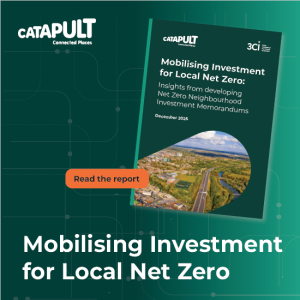
Mobilising Investment for Local Net Zero: Insights from developing Net Zero Neighbourhood Investment Memorandums
File type: pdf
File size: 74.13Mb
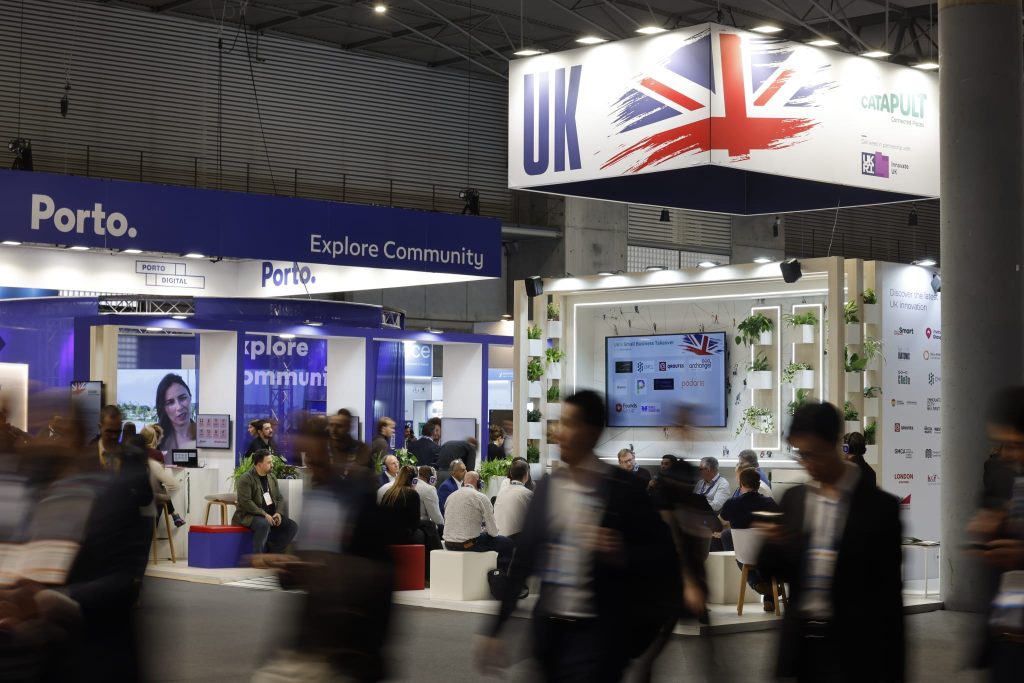
Thousands of delegates joined a record 31 partners representing 10 UK cities and regions and 12 innovative businesses on the UK Pavilion, to promote investment opportunities and build global partnerships.
Highlights included a keynote address by the Department for Business and Trade’s Head of Place, Helen Creighton on the role of the Industrial Strategy to drive regional economic growth. Further sessions featured speakers from Sunderland and Glasgow City Councils on the impact of data architecture and generative AI in transforming public services; and the launch of a digital twin by Nexus Leeds, the innovation and collaboration hub of the University of Leeds.
Reflecting on the three-day event, Connected Places Catapult’s Chief Executive, Erika Lewis said the UK Pavilion was a tremendous showcase of partnership in action.
“For us, our stand really was about our partners; we were selling Team UK, and it did two things. Firstly, it represented an inward investment opportunity; cities and regions were able to promote themselves to delegations from around the world, and secondly a trade opportunity, for the SMEs who joined us. It was all about learning from one another, and having the chance to strike up great conversations.”Erika Lewis, Connected Places Catapult’s Chief Executive
“We help the places that we work with to think more clearly about how they can draw people into their local economies.” Erika added that the event also demonstrated that the Industrial Strategy is “very cognisant of the geography of the UK”, adding that it fitted with the Government’s theme of places as engines of growth.
Several of the city and region partners on the stand invited high performing SMEs, who are crucial for local business growth to help develop business opportunities, discuss ideas and further their knowledge of developments in wider, international markets. SMEs were also a focus of the agenda during a ‘takeover’ session on the second day, focusing on innovation and the impact of small businesses in key sectors. Day one saw the Department for Business and Trade host a networking brunch, and day two saw UK co-exhibitors and partners host a networking reception on the UK Pavilion.
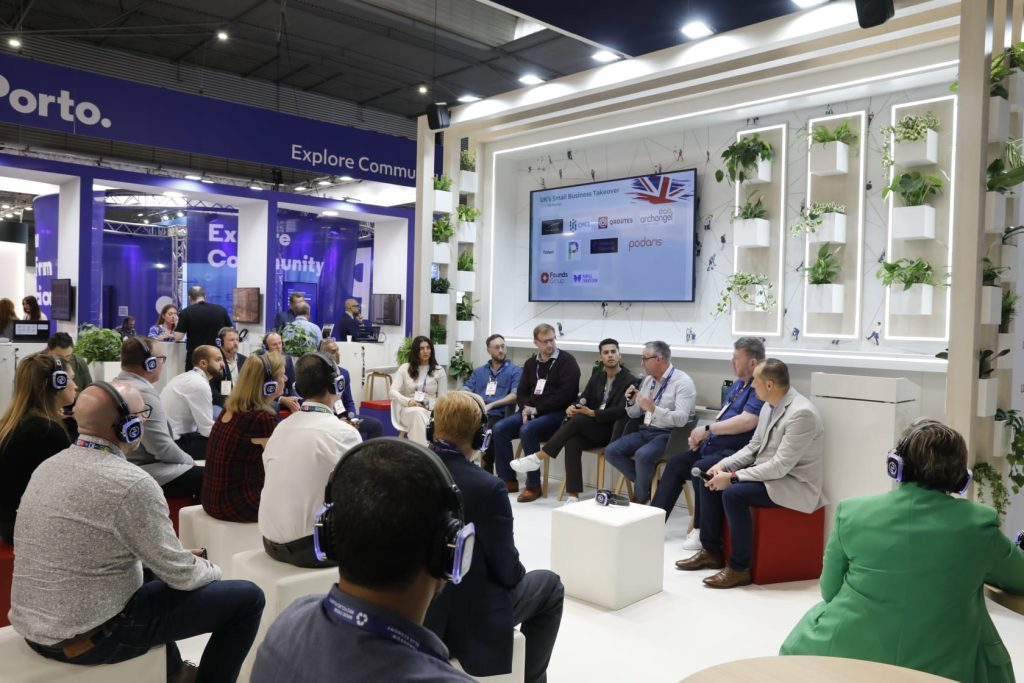
One of the SMEs welcomed to the pavilion was Terminus Technologies. Chief Executive, Joshua Ward said: “To have the backing and support of the UK and the Catapult, and to be able to be show what we can do as a country to the rest of the world, is incredibly exciting.”
The over-riding feeling among participants on the UK Pavilion was one of optimism and positivity, Erika said. “Everyone is now beginning to understand the new UK innovation funding landscape, as many choices have now been made around where some of that infrastructure spend is going to happen.”
“Those incredibly entrepreneurial local areas that we took with us to Barcelona are thinking about how to make the best use of that extra activity, in a way that drives innovation and growth, and ultimately supports the prosperity of their communities.”
Erika joined a panel session on the main stage at the Congress to discuss the role that digital innovation can play to improve resilience in the built environment, and help combat threats including the risk of increased flooding and rising temperatures.
She was joined by Cris Turner of Google, Natalia Olson-Urtecho of Repscan, David Ramirez of FCC Enviro, and Bilel Jamoussi of the International Telecommunication Union.
Erika highlighted how the Climate Resilience Demonstrator (CReDo) is setting a new standard for climate adaptation. “Some of the conversations we’re having in the UK are much more advanced than in other places, particularly around the interrogation of federated data sets on secure platforms,” she noted. “There is still a great need for the data infrastructure work that we’re doing, but we are starting from a really good place.”
She also chaired a session exploring how digital and data sharing infrastructure can help tackle some of the environmental and social problems cities face, alongside speakers from the Liverpool City Region Combined Authority, Innovation City Belfast and CMCL – a data-led SME.
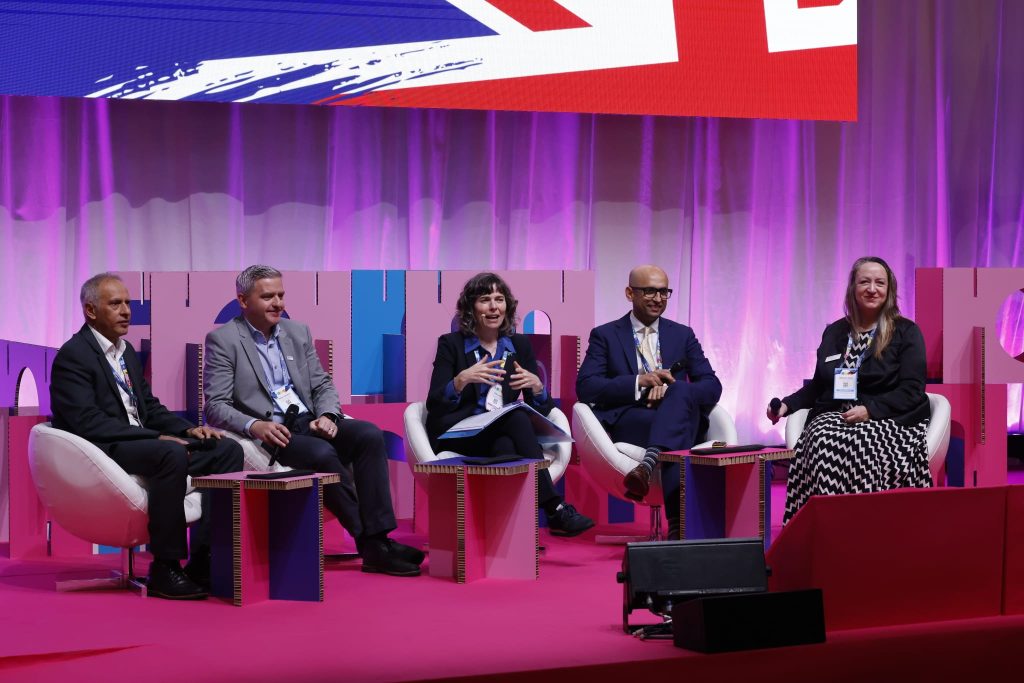
Erika said she came away from the Congress with a strong sense that innovation is all about “people, partnership and purpose” which “run through everything that we do.”
Get involved in our SME community, and read about our work in the built environment, transport and data and digital.

London International Shipping Week is one of the biggest global maritime events in the calendar.
Connected Places Catapult is delighted to be an active partner of the event, celebrating our contribution to accelerating innovation in the UK’s Maritime sector.
Find out more below on the events we’re taking part in, plus some of our recent reports on coastal shipping, future fuels and more.
Meeting in London on 16 September, this gathering will bring together industry leaders, experts, and innovators to discuss the importance of resilience in the maritime sector.
We’ll be discussing key topics, including the impact of GNSS interference on maritime operations, and how robust global data standards form the backbone of safe, sustainable and resilient maritime operations, as well as delving into challenges related to autonomous vessels.
Richard Holland, Head of Maritime at Connected Places Catapult, will be presenting as Maritime Forum vice-chair.
We’ll hear also hear from Royal Institute of Navigation, ITS Norway, Peel Ports, and Zulu Associates, with more to be confirmed soon.
Maritime Innovation Day 2025 is an Innovate UK flagship event to showcase the Department for Transport’s pioneering environmental work in the maritime sector.
This year, Connected Places Catapult’s Head of Maritime Mark Wray will be speaking on the Maritime Investment panel.
We are also delighted to be exhibiting at the event, so please do stop by our stand to discuss the future of maritime innovation with us.

Connected Places Catapult has created an interactive blueprint which aims to accelerate the transition to future fuel adoption by producing a pathway to 2050 for UK ports and harbours.

This report explores how shifting more goods to coastal shipping can relieve pressure on road networks, reduce emissions, and support regional economic growth.
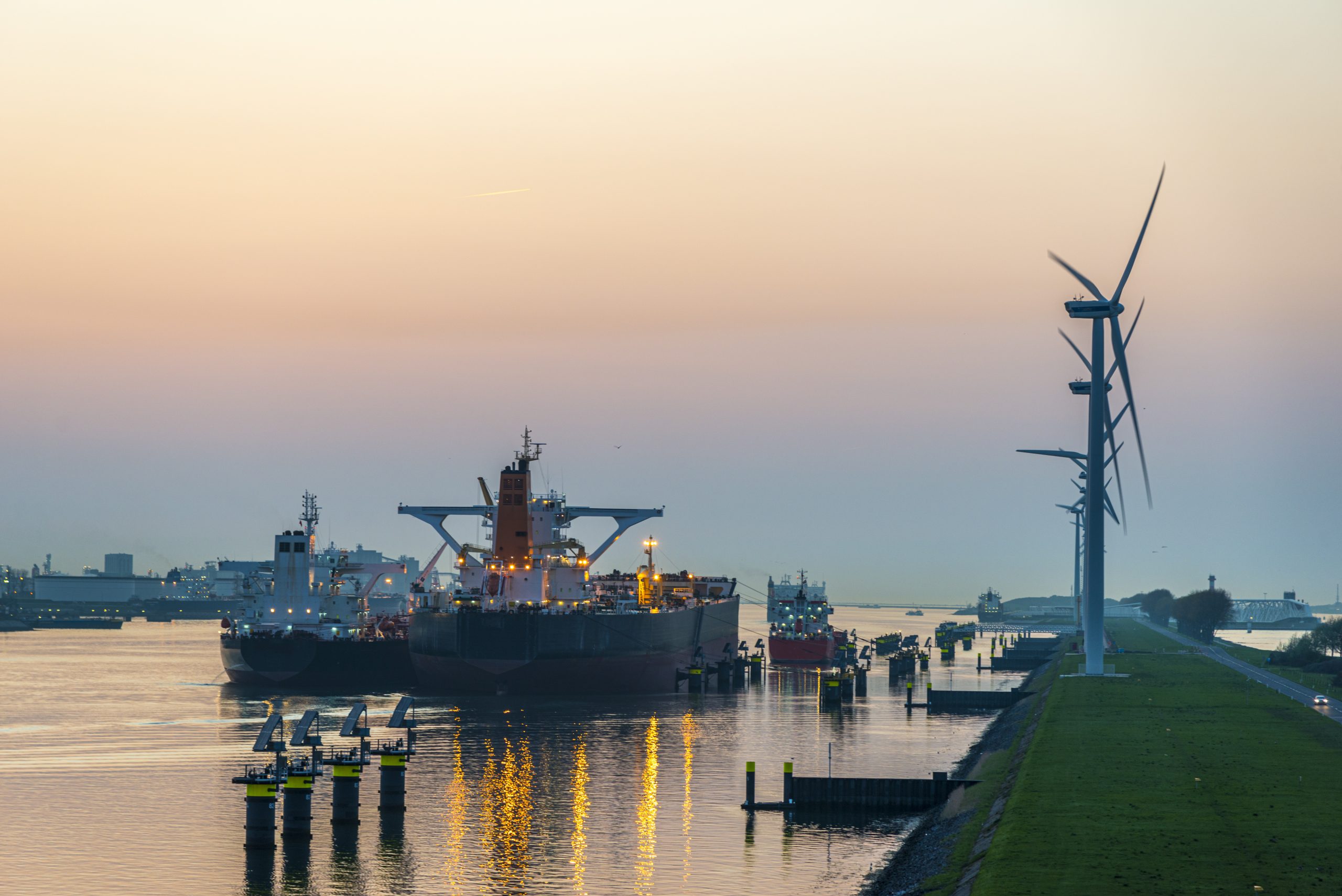
The UK Government made a pledge in the Clydebank Declaration at COP26 to establish six green shipping corridors by 2026. This report describes in detail a pathway to deliver, what could be the first in the UK, between Liverpool and Belfast.

The National Shipbuilding Office’s Centres of Excellence Task and Finish Group has launched a Centres of Excellence (CoE) Playbook, developed in collaboration with Connected Places Catapult.

We’re excited to partner with Fira Barcelona and join 25,000+ visitors from over 130 countries.
Connected Places Catapult will lead the UK Pavilion, joining 1,100+ exhibitors, 600+ speakers, and representatives from 850+ cities.
The event annually attracts a diverse audience of industry executives, government leaders, researchers, and entrepreneurs who come together to explore complex issues at the heart of a new model for cities and society.
Together with 31 partners from UK cities, regions, academia, freeports, and businesses, we will be showcasing smart and innovative solutions they have implemented to help deliver their city ambitions.
Our partners include:
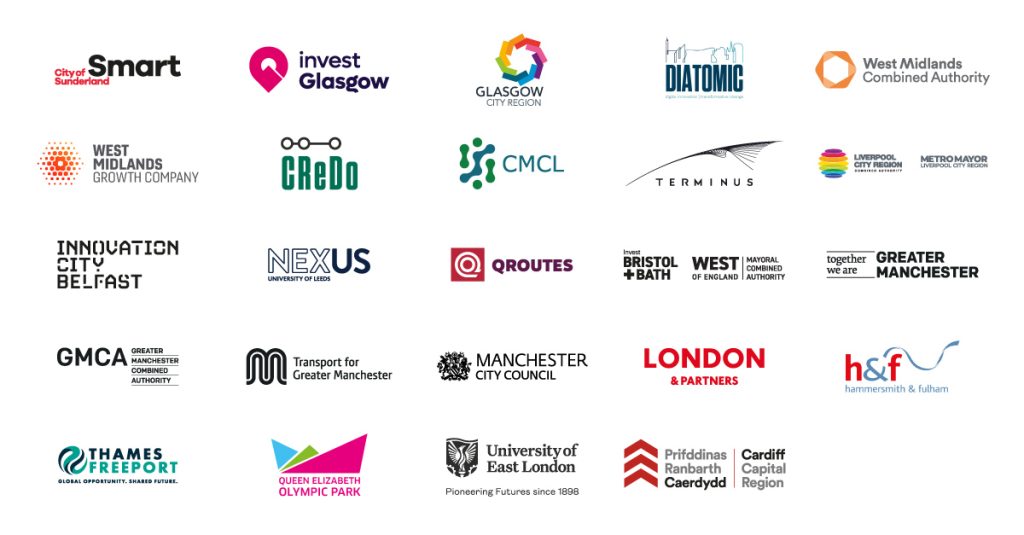
Meet us in person in Hall 3, Stand D131 to share information and extend your network.
Tuesday 4 November | 11:00–12:00
Kick off your day with the Launch of the UK’s Modern Industrial Strategy and our Meet the UK Partners Business Brunch.
We’ll begin at 11:00 with a Welcome Address from Erika Lewis, CEO and UK Government Representative, followed by a networking brunch – a great chance to connect with UK cities, regions, and innovators.
Wednesday 5 November | 17:00–18:00
Join us for Networking Drinks hosted by our UK partners.
Meet the UK delegation and hear how they’re driving innovation and international collaboration to build better, more sustainable communities.
No registration needed – just drop by the UK Pavilion. We’d be delighted to see you there!
To find out how to arrange a business meeting with us and our UK partners, contact us at events@cp.catapult.org.uk or search for Connected Places Catapult on the SCEWC event app.
Led by the Department for Business and Trade (DBT), the UK’s Industrial Strategy is a bold 10-year plan launched in 2025 to drive long-term economic growth, boost business investment, and position the UK as a global leader in future-focused industries.
Hear directly from the UK Government on how the strategy is progressing since its launch – and what’s next for innovation, investment, and international collaboration.
Kick-start your Congress experience with our Networking Brunch! Connect with 20 UK partner organisations – including cities, regions, academia, freeports, and innovative SMEs – all showcasing their smart solutions at the UK Pavilion and have some delicious food and freshly brewed coffee.
This panel explores how AI, data infrastructure, and digital twin technologies – central to the UK’s Industrial Strategy -can drive sustainable growth. It highlights how smart cities, Freeports, and innovation clusters are harnessing digital transformation to build inclusive, resilient economies ready for future challenges.
Explore how cities and tech innovators co-develop infrastructure pilots, investment zones, and innovation districts. This session highlights scalable models for collaboration, procurement, and deployment, with insights on clusters, accelerators, SME involvement, and procurement reform. Learn from UK innovation zones and their global relevance in accelerating smart urban transformation.
Testbeds enable place-based innovation by trialing emerging technologies in real-world settings. Applied to local challenges like transport or public health, they offer controlled environments for experimentation. This helps de-risk investment through validation, user insights, and measurable impact -informing smarter procurement and accelerating adoption across regions.
This session explores how advances in data architecture and generative AI are transforming public services. With practical examples from local authorities, it highlights opportunities for reform and addresses key ethical and security considerations in deploying these technologies.
This session explores how UK Government investment and legislation are reshaping the data landscape. It highlights how cities are implementing national strategies through data sharing, digital twins, and interoperable platforms -building resilience, driving growth, and showcasing why cities are uniquely positioned to lead digital transformation.
UK Cities today are grappling with a perfect storm of infrastructure challenges: ageing buildings, costly maintenance, increased flooding, and rising temperatures are straining systems that were never designed for today’s climate changes and extremes. Failing infrastructure leads to cascading impacts on people, places and transport systems. This panel explores how Data Sharing Infrastructure (DSI) can support national goals like net zero, public service reform, and economic growth across our regions. By aligning policy, technology and collaboration, we can build the frameworks that allow innovation to thrive and places to become more connected and sustainable.
Technology is making UK transport smarter and greener, with AI, data, and automation powering seamless journeys and faster, cleaner logistics. These innovations are building connected cities where efficient, sustainable movement, benefits everyone.
This panel explores how inclusive innovation, policy, and place-based strategies can shape a fairer future for communities across the UK. Speakers will share insights on unlocking opportunity through collaboration, investment, and inclusive design – ensuring no one is left behind in the UK’s transformation journey.
This session would provide an opportunity to explore how cities can collaborate to strengthen urban leadership, building on the experiences of the Emerging Leaders programme and its previous editions.
Join us at The SME Takeover, a casual and relaxed event spotlighting the innovation, agility, and impact of small and medium-sized enterprises across key sectors. Designed to amplify the voices of emerging businesses, the takeover provides a platform for SMEs to showcase their solutions, connect with industry leaders, and contribute to shaping future policy and market trends.
Digital twins are evolving from concept to impact.
This panel explores how governments and stakeholders are using digital twin simulations to anticipate challenges, test scenarios, and deliver measurable outcomes in infrastructure, climate resilience, mobility, and public services. Panellists will share real-world applications, lessons learned, and the potential for smarter, faster, and more effective policy-making.
The launch of the Nexus Digital Twin and its integration into the STRIDE Test-Bed marks a pivotal moment in the evolution of smart city innovation. These platforms serve as dynamic environments for testing, validating, and scaling digital twin technologies across sectors, enabling real-time simulation, predictive analytics, and collaborative problem-solving.
Join us for an informal evening of conversation and connection with leading UK organisations driving smart city innovation. This reception offers a unique opportunity to meet UK partners across government, industry, and academia, explore collaboration opportunities, and celebrate shared ambitions for sustainable urban transformation. Enjoy drinks, light refreshments, and engaging dialogue in a relaxed setting.
This panel brings together international perspectives from Australasia, Europe and the UK to explore what it means to seed and scale innovation districts. Drawing on global experience, speakers will share practical insights into building resilient, future-ready places that unlock inclusive growth, investment, and long-term value.

We’re delighted to partner with the UK’s Real Estate Investment and Infrastructure Forum (UKREiiF) in Leeds, a forum dedicated to unlocking investment and driving regeneration and development across the UK to accelerate economic growth.
This year’s event promises to attract over 16,000 delegates, over 2,500 fringe event attendees, 1,250 speakers and 150 exhibitors from the built environment representing every core UK city and region.
Connected Places Catapult will have its own Pavilion – a dedicated platform for partners and stakeholders from UK cities, regions and freeports to network, collaborate and discuss pressing challenges and solutions in the built environment, transport, data and digital, and international partnerships.




Meet us in Pavilion Square to collaborate, discuss and extend your network.

To find out how to arrange a business meeting with us, join the discussion in the pavilion or collaborate on projects contact us at events@cp.catapult.org.uk
Last year we attracted over 1,300 visitors and 50 speakers. View 2026 pavilion’s programme:
Kick-start your visit to the Forum by learning how we help grow the UK economy by driving the commercialisation of emerging innovations and next technologies in transport and the built environment in our towns and cities.
Hear about how UK cities and place leaders understand the role of innovation – and high-quality, purposeful innovation spaces – in driving economic growth, attracting talent, and supporting sustainable development across different regional contexts.
As UK places look to the exploitation of urban challenges as drivers for local growth and innovation, carefully crafted international partnerships have the potential to derive greater impact in response to common ambitions. The Innovation Twins programme participants, Birmingham and Swansea Bay, will share their insights from different points in their collaboration journey.
Join us for a panel discussion on how innovation in the public realm can drive economic growth, improve community health and well-being, and support sustainability in real estate development.
This session will look at the growing use of digital twins in regeneration to drive economic growth in the West Midlands.
This session will explore how Innovation Districts are reshaping urban economies and driving sustainable inclusive growth through strategic clustering of research institutions, enterprise, startups, and talent. Our expert panelists will examine successful Innovation District models, how to measure their impact on local economies, and the essential elements for driving the innovation economy.
Despite the public sector spending over £400Bn on procurement in the public sector, we still have significant challenges in the built environment around affordable housing, Net Zero, creating liveable places, economic growth and much more. This panel will discuss the opportunities, challenges and recommendations on how public and private collaboration can help create new value.
Hear how the UK Freeports are leading the charge on Place Based Growth, by attracting investment into parts of the country that have historically missed out. Freeports are becoming hotbeds of innovation and building new clusters in sectors of the future, creating thousands of long-term, high quality jobs for local people, join the conversation.
Local Authorities in the UK have set ambitious Net Zero targets that require sector-wide collaboration to achieve. However, there’s still a conflict between the demand for Net Zero funding into the public sector and private investors’ risk appetite. This session explores the perspective of investors on the appeal of place-based investing, the risks it can carry and how financial institutions can overcome these risks to enable Net Zero funding at scale.
This session will explore the approaches taken by Belfast and Liverpool to drive growth through innovation and will also consider two city regions roles as major places within the Irish Sea Rim with its rich assets and talent pool.
Explore how trusted standards support credible, consistent net zero strategies in infrastructure—enabling whole-life carbon management, aligning global efforts, and empowering collaboration across the value chain to drive meaningful climate action.
Attend this session to gain practical insights into using trusted standards like PAS 2080 and the ISO Net Zero Guidelines to embed decarbonisation across infrastructure projects, align with climate targets, and future-proof your strategy.

Join us to hear from leading voices from organisations at the forefront of shaping the next chapter of digital planning in the UK. Our speakers will reflect on the successes and lessons learned from nearly a decade of digital transformation in the UK planning system, and look ahead to explore the emerging challenges and innovation opportunities in spatial planning.
We are delighted to partner with Historic England and Buttress Architects. Join the launch of Historic England’s first Heritage Investment Prospectus at UKREiiF 2025 in Leeds. Hear first-hand a curated collection of historic sites and buildings across England, many with planning permission or agreed development briefs with local authorities, which actively seeking partners or investors to help write their next chapter.


Meet place senior decision makers from investors, developers, occupiers and operators within commercial property. This is a closed event organised in our pavilion together with the UKREiiF team, express your interest to attend by contacting Kevin Smith at kevin.smith@ukreiif.com.
We know it’s the third day of UKREiiF and you may well be exhausted so we have got you! Join us light breakfast and connect with other members and those within the wider ecosystem. It will be informal but will give you the chance to catch up with all those working within or alongside Innovation Districts.
Please feel free to extend to colleagues, but please do get in touch with us at events@cp.catapult.org.uk so we know the number.

Following the launch of our recent The Art of the Possible report, this session explores why community-based finance matters, what the research reveals, and what needs to happen next to unlock local investment and drive economic growth.

Join City Science to explore the need to act quickly and efficiently to progress your net zero plans. With the need for meaningful outcomes with current budget constraints, how do we get to net zero at pace? How do we fast track local plans, economic strategies and infrastructure and create better communities? Join us to hear more.


We are delighted to once again participate in Innovation Zero, and we’re contributing to a number of sessions, including:
Andrew Chadwick, Ecosystem Director, Air Mobility & Airports, joining the Fuelling Flight: Hydrogen session on 1 May at 11:45.
Alison Young, Head of Global Investment, joining the session on Funding the Automotive Transformation, on 1 May at 12:25 in the Transport & Mobility Forum.

This year, we are proud to host our own Pavilion, a place designed to showcase real innovation, and provide opportunities to connect with thought leaders, and UK and global peers.
To review our full Agenda of sessions and activities taking place over the three days and plan your visit, please head to the UKREiiF website > Programme tab > Download Programme or > Click on the Connected Places Catapult Pavilion dot to browse online.
Make sure to visit our Pavilion in Pavilion Square, we look forward to connecting with you in Leeds!

We’re delighted to participate in the Open & Agile Smart Cities Conference. Make sure to visit our Connected Places Catapult stand on the show floor and to join the sessions our experts are participating in over the course of the two days.




“Sometimes you can literally taste pollution in the air,” remarks industrial product designer and entrepreneur Matteo Maccario. “Once you know it is there – and exactly what you are breathing in – it’s hard to ignore.”
Matteo and colleagues from start-up company Pluvo have developed an air purification device for use in large public spaces, known as the ‘Pluvo Column’, and is about to install its first units on two railway station platforms: a couple at Birmingham New Street and one at Salisbury station in Wiltshire.
The company has been supported by Connected Places Catapult on two recent accelerator programmes: one focused on Intelligent Mobility in association with innovation agency Wayra UK and another set around Milton Keynes. It has also been part of an SME engagement programme and network with the Catapult.
The Pluvo Column features a three stage filtration system to remove airborne pollutants including exhaust gases – such as nitrous and sulphur oxides – and particulate matter. Air is sucked in from the base of the unit, filtered and released back into the local environment above head height. The units can operate either to a pre-determined schedule, or start working when air quality monitors housed inside the unit detect that levels of pollutants have reached a threshold.
“We are confident that the devices can have a significant impact on air pollution within a radius of 25 metres or greater,” Matteo says. “And as you get closer to around 13 metres, levels of particulate matter have been found to reduce by about two thirds.
“For the trials in Birmingham and Salisbury we are targeting areas with seating where people are waiting for trains, in order to create cleaner air zones, as both stations see a fair amount of diesel trains passing through. But the devices could also help station managers to better understand the impact that certain trains can have on air pollution; highlighting the times of day when spikes in pollution are being seen – and for how long.”Matteo Maccario, CEO, Pluvo
Matteo developed the air filtration device alongside company co-founder Rikesh Chotai after graduating from a double Masters in innovation design and engineering with Imperial College London and the Royal College of Art.
Their aim was to develop a system that not only improves air quality, but looks attractive in an urban setting – and can generate revenue.
Matteo and his team researched and tested a series of existing filtration technologies – most of which were designed either for small enclosed spaces like homes, or larger industrial processes – and refined them for use in public settings.
They set about designing infrastructure to house the purifier and came up with a 2.7 metre high ‘totem’ which has an elliptical form and no sharp corners. “We were very focused on how the column should look. The fact it is an elliptical shape makes the engineering a bit more difficult, but we were keen to maintain the aesthetic,” Matteo says.
Each totem features advertising screens on two sides as a mechanism to help pay the running costs and generate income. Static advertisements will be displayed for the initial station trial sites, but digital LED screens are planned for future iterations of the device.
Matteo adds that if the units prove to be a commercial success, they may incentivise clients to install more of them; helping to clean even more of the air at railway stations.

Pluvo’s original plan was to install air purification devices alongside busy roads and in town centres. Trials took place beside the North Circular Road in London but when it came to permanent installations, council planning processes proved slow and unpredictable. Matteo decided to pivot towards transport hubs and the rail environment and partnered with Network Rail (which manages Birmingham New Street) and South Western Railway (which looks after Salisbury) to trial the Pluvo Column.
The company realised that the device’s impact may be even greater at stations than beside streets because the units can be placed at pollution hotspots, close to where many people gather and wait.
Matteo adds that the devices could work equally as well in other transport hubs, such as metro stations, inside multistorey carparks and beside pick-up and drop-off zones at airports.
Placing clean air devices prominently in public spaces could also help to raise the importance of clean air among the public, Matteo suggests – especially if the messaging of the brands being advertised on the side of the units has an environmental theme. “Everyone talks about sustainability and the need to limit climate change, but unfortunately the threat of air pollution to human health doesn’t get as much attention. The more people can become educated about the importance of clean air, the more chance we have of seeing legislation introduced to help reduce the problem.”
Pluvo’s participation in the Intelligent Mobility accelerator with Connected Places Catapult and subsequent showcase day led to discussions with rail industry representatives, including an innovation manager working for South Western Railway which resulted in the Salisbury trial.
“The Catapult made several important connections for us, including with Guy’s and St Thomas’ Hospital in London which carries out air quality research,” Matteo says. “We were also invited along to various events such as rail investor days, and have been kept in the loop when opportunities arise.”Matteo Maccario, CEO, Pluvo
Matteo Maccario was born in Nashville, Tennessee to Italian parents and the family moved to Canada when he was 11. As a child, he remembers wanting to be an inventor and took a keen interest in the environment and nature.
His father was an engineer “which probably influenced my career” and Matteo enrolled on a mechanical engineering degree at Western University before spending four years of his early career at a heavy machinery firm involved in fabrication and assembly.
He later worked as a lean business consultant, and participated in a climate impact and entrepreneurship programme with the European Institute of Innovation and Technology. He also enrolled on a circular economy fellowship programme with the Ellen MacArthur Foundation, led by the former sailor.
In 2016 he enrolled on the double Masters course with Imperial and the Royal College, which gave him an appreciation of how engineering and design can come together. Five years ago, Matteo co-founded Pluvo. The team outsources the manufacturing of the new devices in the UK, but for now Pluvo assembles the units itself. “I enjoy getting hands on; it’s important to physically feel the joy or pain of how the design comes together,” says Matteo.
“Our primary focus with the units is functionality, but we also consider the sustainability of the materials we use, their embedded carbon and whether our units can be easily updated, upcycled or reused, rather than ending up in landfill in some distant future.
“The start of our journey has been full of learnings,” he adds. “We are still in our early days, but have investors on board and are looking to raise £1 million to help with our expansion,” he says. “I’ve been fortunate to work on many interesting projects, but this has been the most exciting journey yet.”
Matteo also joined us on a previous episode of the Connected Places podcast – listen below.

